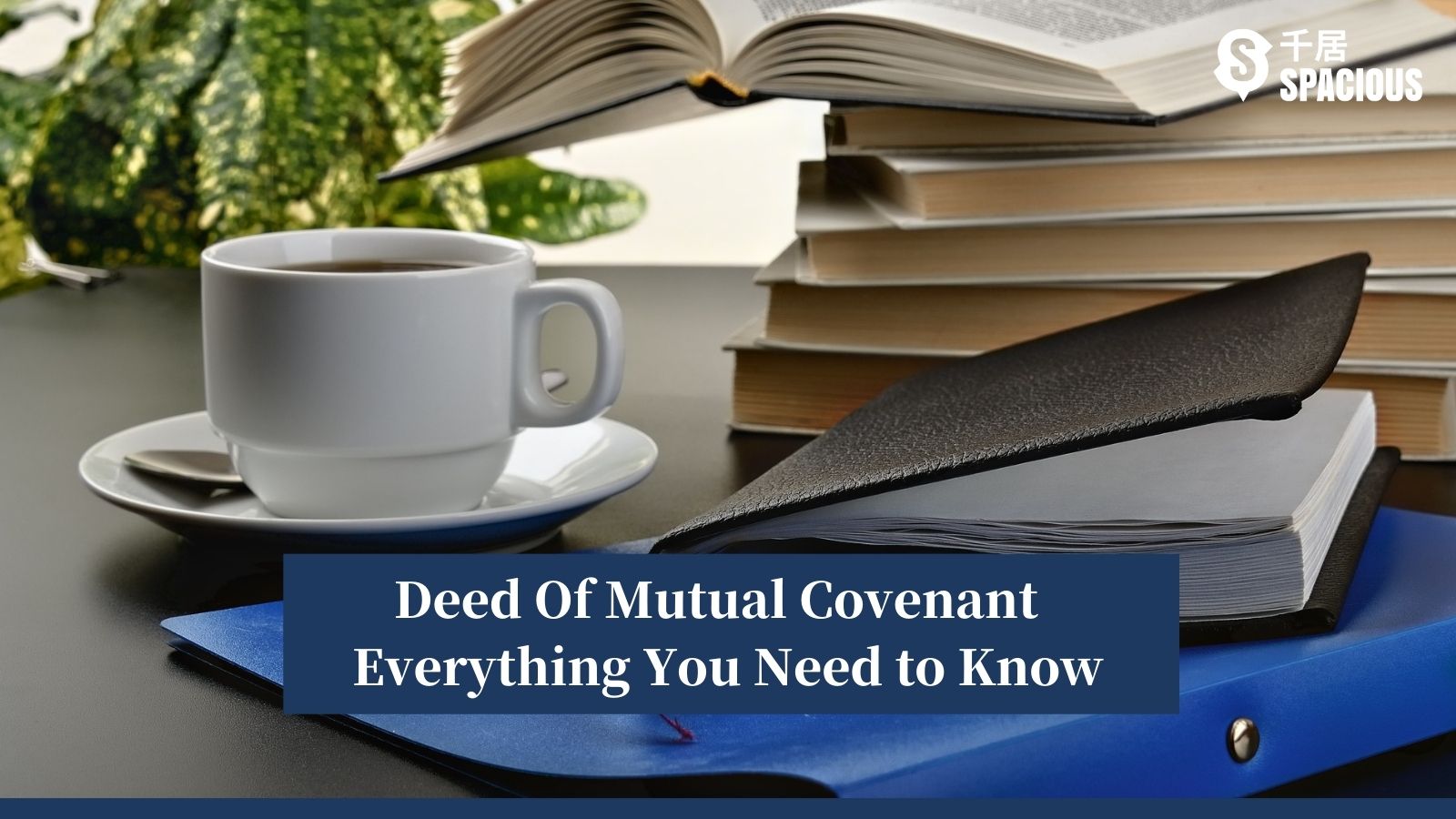
If you think that you can do whatever you want inside your property, think again. The rights, responsibilities, and obligations of the owners are all governed by the building’s Deed of Mutual Covenant (DMC).
The DMC can be over one hundred pages long, and you may have already spent a lot of time studying the sales brochure before purchasing the property.
Now that you own the property, you have another lengthy document to read through. Let Spacious saves you the hassle and summarise the key points for you.
Jump to: What is DMC | Main Contents of the DMC | Common Provisions in the DMC | Consequences of violating the DMC | How to access the DMC | FAQ
What is the Deed of Mutual Covenant (DMC)?
In simple terms, the Deed of Mutual Covenant is the set of rules governing the residence. It is drafted by the developer and is a legally binding document that covers the estate regulations and sets limitations on the management, residence, and use of the property. It serves as the “House Rules” for the entire building.
When a buyer signs the assignment, it includes a commitment to abide by the DMC. In other words, after the developer and the first owner have signed the DMC, subsequent owners can only implicitly agree to it.
Main Contents of the DMC
The DMC can be over one hundred pages long. To summarize the key points, they include:
- The lot number of the land where the building is situated;
- The master floor plan of the building;
- The undivided shares and the management shares for individual units, as well as the total number of shares for the property;
- The ownership and exercise rights of the parts of the building that are restricted to use by the owners only;
- The scope of the common areas;
- The rights and responsibilities of individual owners;
- The rules that individual owners must follow;
- The appointment process, powers, and responsibilities of property management agents;
- The proportion of management fees that individual owners should bear for their respective properties;
- The procedures and rules for forming the owners’ committee;
- The procedures and rules for forming the owners’ corporation;
- The procedures and rules for hiring building managers or management companies;
- How to make decisions regarding building maintenance or repairs;
- How to determine the amount of management fees;
- The restriction on using residential units for commercial activities, and so on.
Find or sell properties on Spacious
Common Provisions in the DMC
The DMC contains many provisions that directly affect the daily lives of residents and often lead to disputes.
Subletting
One of the provisions is subletting restrictions. Some owners may rent out individual rooms of a single unit to different tenants for higher rental returns. Some DMCs specify that subletting is prohibited to prevent the impact on the use of common areas.
However, such provisions are difficult to enforce, as the management company and the owners’ corporation have no easy way of knowing the relationships between individual residents. Any enforcement action requires reasonable evidence, such as the sublease agreement.
Pet ownership
Some residents keep pets as companions. If the DMC does not specify any rules on pet ownership, it is generally allowed. However, some DMCs may have restrictions on the types of animals allowed.
For example, public housing estates allow residents to keep small household pets, including neutered cats, but prohibit dogs. Even if the DMC allows pet ownership, it does not mean that owners have a free pass to let their pets roam freely.
If pets cause serious disturbance to neighbors, the owners’ corporation has the right to take legal action. The binding power of the DMC overrides the rules and agreements drafted by the owners’ organization. If the DMC does not prohibit pet ownership, but the owners’ committee subsequently requires a ban, it is not sufficient to force the entire building to comply.
Window Grilles
The DMCs from many newer buildings often specify that the exteriors cannot be altered. Simply changing or adding window decorations may already violate the deed.
For example, some new seaside properties have adopted designs with large floor-to-ceiling windows and glass balconies. Some residents may want to install additional window decorations, or use the working platform space for hanging clothes or drying laundry.
Such modifications must first be applied to the management company for evaluation on whether they violate the deed.
If the modifications are carried out without prior permission of the management company, it may become a violation case. Once the case is reported to the Building Department, a letter will be sent to the resident requesting the removal or restoration of the modifications.
Consequences of violating the DMC
If a resident repeatedly violates the DMC and refuses to comply, the management company and the incorporated owners have the right to file a lawsuit against the owner and seek compensation.
Common violation cases include failing to pay management fees for an extended period of time; keeping pets without permission; causing serious disturbance to neighbors ; impacting others’ rights to use the common areas.
How to access the DMC
If you want to access the DMC for a building, you can follow these steps:
- Go to the Integrated Registration Information System (IRIS) website of the Land Registry to conduct a search. The fee for the search is $10.
- The search result will display the “Deed of Mutual Covenant and Management Agreement with Plan”. Take note of the registration summary number provided.
- Select “Order Land Documents” from the IRIS system.
- Choose “Registration Summary”.
- Enter the registration summary number.
- Download the document, which costs $100.
Sometimes, it is an important factor for property searchers to know whether pets can be kept in a residential building. If you are a landlord, remember to specify this information when listing with Spacious.
Find or sell properties on Spacious
FAQ
Can the Deed of Mutual Covenant be amended?
If an owner has any objections to the Deed of Mutual Covenant, they must obtain the unanimous consent of all owners in the building before any changes can be made.
What rights do owners have that are listed in the Deed of Mutual Covenant?
The main rights include: the right to use their unit; the right to exercise shared rights in the building; the right to use common areas and facilities; and the right to vote at owners’ meetings.









